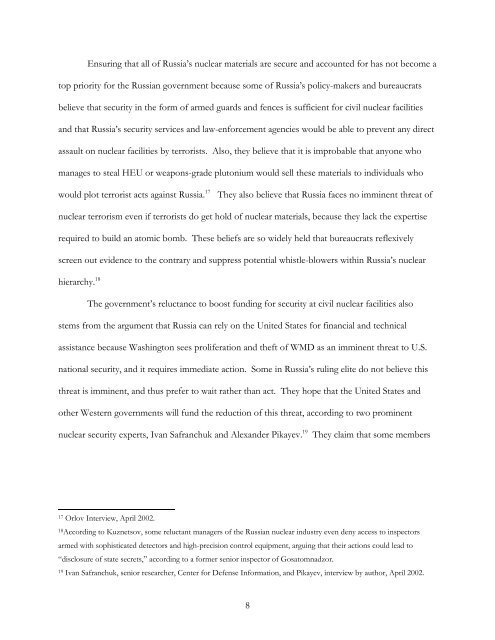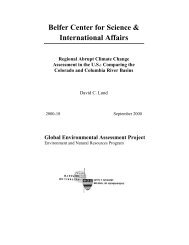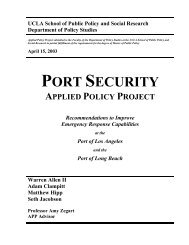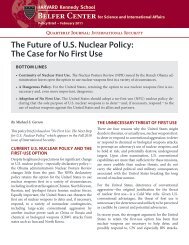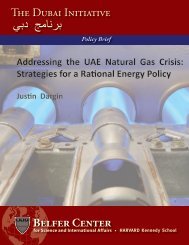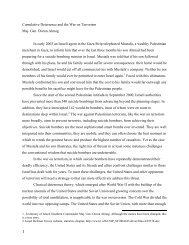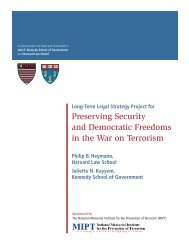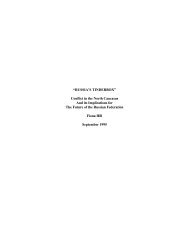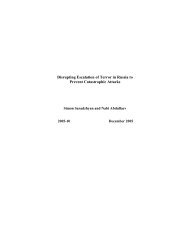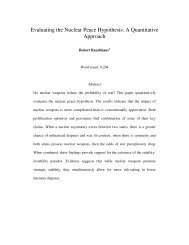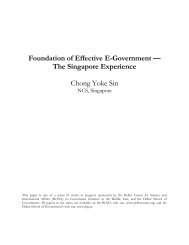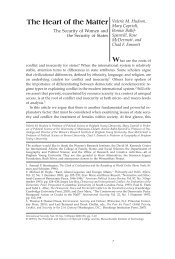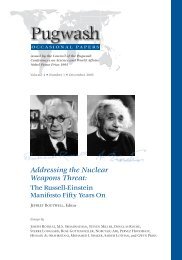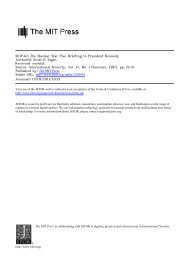Russia - Belfer Center for Science and International Affairs - Harvard ...
Russia - Belfer Center for Science and International Affairs - Harvard ...
Russia - Belfer Center for Science and International Affairs - Harvard ...
Create successful ePaper yourself
Turn your PDF publications into a flip-book with our unique Google optimized e-Paper software.
Ensuring that all of <strong>Russia</strong>’s nuclear materials are secure <strong>and</strong> accounted <strong>for</strong> has not become a<br />
top priority <strong>for</strong> the <strong>Russia</strong>n government because some of <strong>Russia</strong>’s policy-makers <strong>and</strong> bureaucrats<br />
believe that security in the <strong>for</strong>m of armed guards <strong>and</strong> fences is sufficient <strong>for</strong> civil nuclear facilities<br />
<strong>and</strong> that <strong>Russia</strong>’s security services <strong>and</strong> law-en<strong>for</strong>cement agencies would be able to prevent any direct<br />
assault on nuclear facilities by terrorists. Also, they believe that it is improbable that anyone who<br />
manages to steal HEU or weapons-grade plutonium would sell these materials to individuals who<br />
would plot terrorist acts against <strong>Russia</strong>. 17 They also believe that <strong>Russia</strong> faces no imminent threat of<br />
nuclear terrorism even if terrorists do get hold of nuclear materials, because they lack the expertise<br />
required to build an atomic bomb. These beliefs are so widely held that bureaucrats reflexively<br />
screen out evidence to the contrary <strong>and</strong> suppress potential whistle-blowers within <strong>Russia</strong>’s nuclear<br />
hierarchy. 18<br />
The government’s reluctance to boost funding <strong>for</strong> security at civil nuclear facilities also<br />
stems from the argument that <strong>Russia</strong> can rely on the United States <strong>for</strong> financial <strong>and</strong> technical<br />
assistance because Washington sees proliferation <strong>and</strong> theft of WMD as an imminent threat to U.S.<br />
national security, <strong>and</strong> it requires immediate action. Some in <strong>Russia</strong>’s ruling elite do not believe this<br />
threat is imminent, <strong>and</strong> thus prefer to wait rather than act. They hope that the United States <strong>and</strong><br />
other Western governments will fund the reduction of this threat, according to two prominent<br />
nuclear security experts, Ivan Safranchuk <strong>and</strong> Alex<strong>and</strong>er Pikayev. 19 They claim that some members<br />
17 Orlov Interview, April 2002.<br />
18 According to Kuznetsov, some reluctant managers of the <strong>Russia</strong>n nuclear industry even deny access to inspectors<br />
armed with sophisticated detectors <strong>and</strong> high-precision control equipment, arguing that their actions could lead to<br />
“disclosure of state secrets,” according to a <strong>for</strong>mer senior inspector of Gosatomnadzor.<br />
19 Ivan Safranchuk, senior researcher, <strong>Center</strong> <strong>for</strong> Defense In<strong>for</strong>mation, <strong>and</strong> Pikayev, interview by author, April 2002.<br />
8


